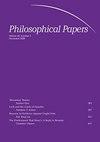同性恋和非洲人:存在的矛盾?
IF 1.3
3区 哲学
0 PHILOSOPHY
引用次数: 2
摘要
摘要非洲文化中对性的讨论有着悠久的历史,但自20世纪90年代以来,非洲大陆对同性恋的道德反思经常演变成愤怒,并在几个国家引发了一系列反同性恋立法。对恐同倾向的反驳遇到了非洲文化中普遍存在的一种信念的障碍,即为社区补充生育是一项宝贵的道德义务。一些哲学家认为这些是夸大的抑制,不合理地阻碍了社会对同性恋的接受,并提出了他们认为是自我辩护的政治道德原则作为解决方案,它终止于价值观的多元化,如接受性取向的平等和维护选择和满足性欲的自由权利。我质疑这种自我辩护的规范性原则的充分性,并认为它们提供的解决方案贬低了非洲赞成出生者立场的道德点。因此,我在Kwame Gyekye的温和社群主义人格理论的本体论基础上提出了一个道德论点,认为这是同性恋最有说服力的理由。本文章由计算机程序翻译,如有差异,请以英文原文为准。
Being Gay and African: A Contradiction in Being?
Abstract Discussion of sexuality in African cultures has a long history, but since the 1990s ethical reflections on homosexuality on the continent have often degenerated into furors and provoked a spate of anti-gay legislation in several countries. Refutations of homophobic dispositions encounter as barrier a pervasive belief in African cultures, that childbearing for community replenishment is a cherished moral duty. Several philosophers consider these to be exaggerated inhibitions that unjustifiably impede social acceptance of homosexuality, and have proposed as a solution what they consider to be self-justifying political-moral principles, that terminate in value-pluralistic ideas such as the acceptance of the equality of sexual orientations and vindication of the right to the freedom to choose and satisfy sexual desire. I question the adequacy of such self-justificatory normative principles and consider the solutions they proffer as depreciating the moral point of the African pro-natalist position. Consequently, I develop a moral argument grounded in the ontology of Kwame Gyekye’s moderate communitarian theory of personhood as the most persuasive justification for homosexuality.
求助全文
通过发布文献求助,成功后即可免费获取论文全文。
去求助
来源期刊

Philosophical Papers
PHILOSOPHY-
CiteScore
2.10
自引率
0.00%
发文量
18
期刊介绍:
Philosophical Papers is an international, generalist journal of philosophy edited in South Africa Original Articles: Articles appearing in regular issues are original, high-quality, and stand-alone, and are written for the general professional philosopher. Submissions are welcome in any area of philosophy and undergo a process of peer review based on initial editor screening and refereeing by (usually) two referees. Special Issues: Topic-based special issues are comprised of both invited and submitted papers selected by guest editors. Recent special issues have included ''Philosophy''s Therapeutic Potential'' (2014, editor Dylan Futter); ''Aging and the Elderly'' (2012, editors Tom Martin and Samantha Vice); ''The Problem of the Criterion'' (2011, editor Mark Nelson); ''Retributive Emotions'' (2010, editor Lucy Allais); ‘Rape and its Meaning/s’ (2009, editor Louise du Toit). Calls for papers for upcoming special issues can be found here. Ideas for future special issues are welcome.
 求助内容:
求助内容: 应助结果提醒方式:
应助结果提醒方式:


